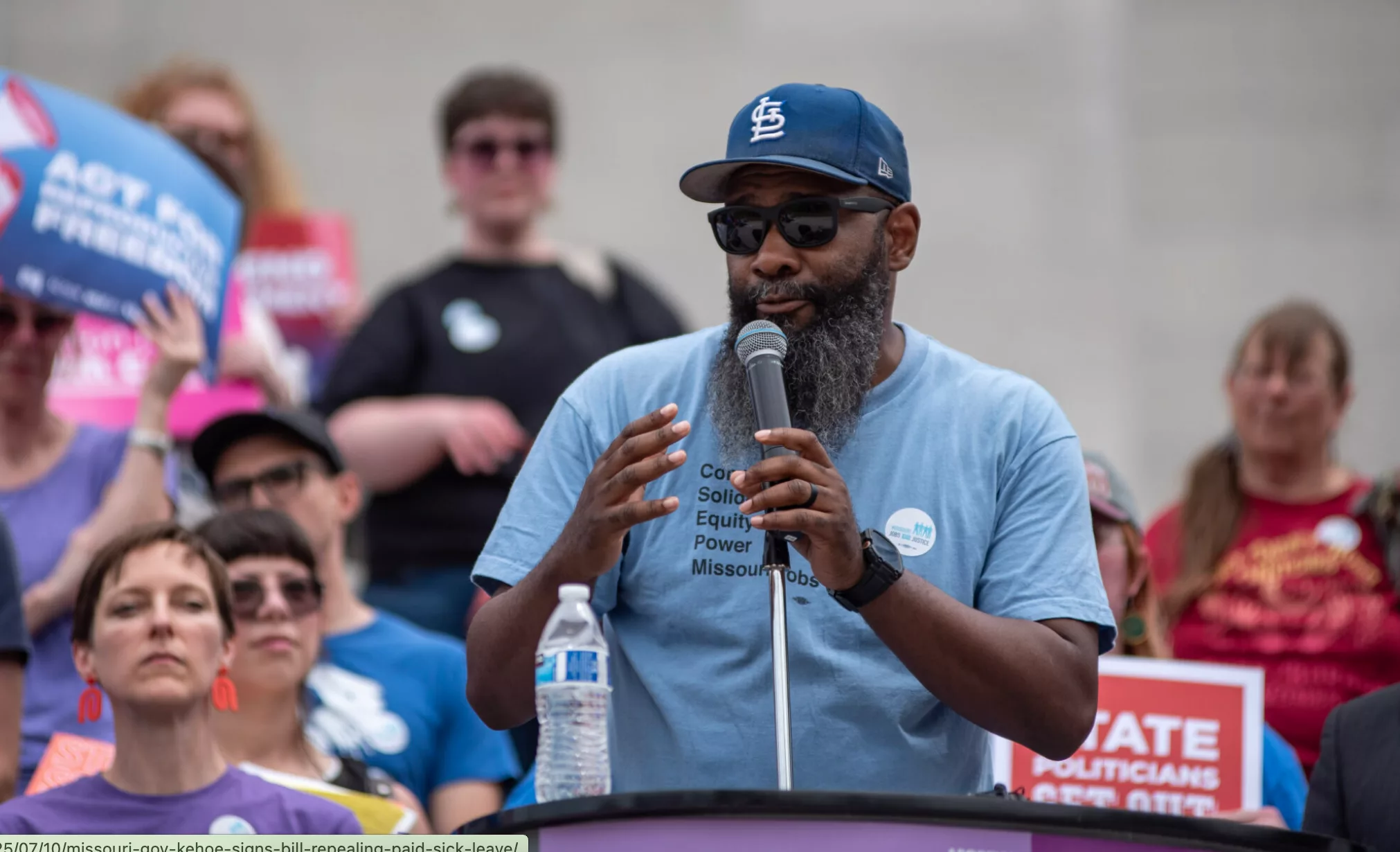
Business groups lobbied heavily to overturn the measure passed by 58% of voters, arguing it would cost jobs. The bill also repeals annual inflation adjustments for the minimum wage, in effect since 2006.
BY: RUDI KELLER
Missouri Independent
Missouri workers who started accruing paid sick leave on May 1 will lose it Aug. 28 under legislation signed Thursday by Gov. Mike Kehoe.
The new benefit, linked to an increase in the minimum wage passed with 58% of the vote in November, became a target for business lobbying interests. Republican allies in the General Assembly pushed it to Kehoe’s desk by invoking a rarely used state Senate rule to shut down debate over Democratic objections.
The action followed a pattern established over the past 15 years where conservative Republicans have used their majorities in the legislature to roll back or repeal measures that became law through initiatives pushed to the ballot by progressive groups.
The minimum wage initiative was a statutory change, meaning lawmakers could make any changes that would command a majority.
In a news release issued after he signed the bills, Kehoe said he was approving the bill to defend small businesses.
“Today, we are protecting the people who make Missouri work—families, job creators, and small business owners—by cutting taxes, rolling back overreach, and eliminating costly mandates,” Kehoe said in the release.
Missouri House Democratic leader Ashley Aune of Kansas City denounced Kehoe’s decision to sign the bill as an attack on workers and voters.
“The governor’s action today demonstrates the absolute disdain Republicans have for working Missourians,” Aune said in a news release. “But in stripping workers of their legal right to earned sick leave, the governor and his allies have probably guaranteed this issue will be back on the ballot next year as a constitutional amendment that will place worker protections beyond their reach.”
Richard Von Glahn, policy director for Missouri Jobs with Justice, the organization that helped lead the campaign for the paid sick leave law, has filed a proposed constitutional amendment targeting the 2026 ballot.
The repeal doesn’t take effect immediately because Republicans were unable to muster the two-thirds majorities needed to pass an emergency clause even though the GOP holds more than two-thirds of the seats in each chamber. It goes into effect at the same time as other bills approved this year and signed by Kehoe.
The increased minimum wage, $13.75 an hour, took effect on Jan. 1. A second increase is set for Jan. 1, 2026, when it will increase to $15 an hour. The bill signed Thursday also repeals a provision, in effect since 2006, to adjust the minimum wage annually for inflation.
Organizers of the initiative that put the measure on the ballot set May 1 as the starting date for paid leave, available for personal illness or to stay home with a sick family member. The intent was to allow more time for businesses to adjust to the new rule than the short period between the election and the new year.
Workers at businesses with receipts greater than $500,000 a year are accruing at least one hour of paid leave for every 30 hours worked. Employers with fewer than 15 workers must allow workers to earn at least 40 hours per year, with larger employers mandated to allow at least 56 hours.
The measure made sick leave guaranteed for 728,000 workers who lacked it statewide, or over 1 in 3 Missouri workers, according to an analysis from the progressive nonprofit the Missouri Budget Project.
The leave can be used currently, but the repeal makes it uncertain if accrued leave can be used after the law is repealed.
The battle over the leave provisions revolved around its economic effect, pitting business interests and their backers in the legislature against supporters of the law.
During a House committee hearing in February, the sponsor, Republican state Rep. Sherri Gallick of Belton, suggested that employees can’t be trusted to use paid sick leave only for the reasons allowed by the law.
“Under the mandated sick leave, potential abuse is nearly impossible to address,” Gallick told the House Commerce Committee. “Employers cannot ask an employee why they were absent, leaving them vulnerable to lawsuits for merely inquiring.”
In a news release Thursday, Kara Corches, president and CEO of the Missouri Chamber of Commerce and Industry, called the mandated paid sick leave a “job killer.”
“Missouri employers value their employees and recognize the importance of offering competitive wages and benefits, but one-size-fits-all mandates threaten growth,” Corches said in the release.
At a May news conference, state Rep. Betsy Fogle, a Springfield Democrat, said that when Missouri workers are successful, businesses will succeed.
“The idea that providing workers with more protections is a business killer is wild,” she said. “…To try to make this seem like this is something that will kill business, that will keep businesses from opening, I think it’s absurd, and I think it’s quite disappointing, and I think it sends absolutely the wrong message.”
The action on sick leave is similar to a bill in 2011 weakening provisions of a ballot measure from 2010 called the “Puppy Mill Cruelty and Prevention Act,” that specified appropriate living conditions for breeding operations and including action this year to overturn the abortion rights amendment approved in November.
The GOP’s willingness to overturn voter actions has led many initiative organizers to push their proposals as constitutional amendments, which require a statewide vote to repeal or revise. Amendments to legalize marijuana, expand Medicaid coverage, revise the legislative redistricting process and protect abortion rights have all been passed as constitutional amendments.
The Republican majority has responded by successfully pushing a second revision of redistricting and placing an abortion rights repeal on the 2026 ballot. A court challenge to Medicaid expansion was rejected by the Missouri Supreme Court.
